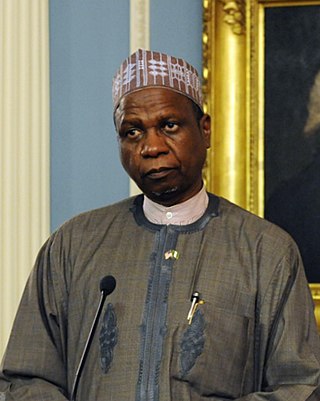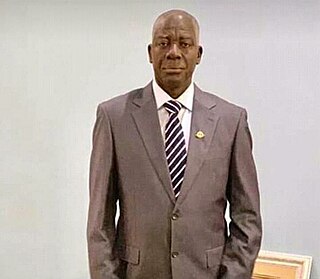
The president of Nigeria, officially the president of the Federal Republic of Nigeria, is the head of state and head of government of the Federal Republic of Nigeria. The president directs the executive branch of the Federal Government and is the commander-in-chief of the Nigerian Armed Forces.

Umaru Musa Yar'Adua ; 16 August 1951 – 5 May 2010) was a Nigerian politician who served as the president of Nigeria from 2007 until his death in May 2010. He won the Nigerian presidential election held on 21 April 2007, and was sworn in on 29 May 2007.

Babagana Kingibe OV GCON is a Nigerian diplomat, politician and civil servant who has held several high ranking government offices, culminating in his appointment as the Secretary to the Government of the Federation from 2007 to 2008. He spent over a decade in the Foreign Service cadre and has been in politics since the 1970s, serving six heads of state; most recently as a member of the inner circle of President Muhammadu Buhari.
The National Security Organization (NSO) of Nigeria, or Nigerian Security Organization, was created under Decree number 27 of 1976 by the military regime of General Olusegun Obasanjo, after the failed Dimka coup which claimed the life of former Head of State General Murtala Mohammed. The NSO was given a mandate of co-ordinating Internal Security, Foreign Intelligence and counterintelligence activities. It was charged with the detection and prevention of any crime against the security of the state, with the protection of classified materials, and with carrying out any other security missions assigned by the president.

Turai Umar Musa Yar'Adua is the widow of the former Nigerian president and former Katsina State Governor, Umaru Musa Yar'Adua. She was the First Lady of Nigeria from 2007 until the death of her husband on 5 May 2010.

Mahmud Yayale Ahmed, CFR is a Nigerian civil servant and politician who served as Defence Minister of Nigeria.
Mohammed Buba Marwa, is a retired Nigerian army brigadier general, who is serving as the Chairman of the National Drug Law Enforcement Agency (NDLEA) since January 2021. He previously served as governor of Lagos State from 1996 to 1999 during the military regime of General Sani Abacha and Abdulsalami Abubakar and governor of Borno State from 1990 to 1992 during the military regime of General Ibrahim Babangida.
Shettima Mustafa was a Nigerian academic and politician. After an early career in medicine, local administration, and media, Mustafa studied agriculture at university, eventually earning a Doctor of Philosophy degree. He became a commissioner in Borno State and joined the Nigerian People's Party, becoming their vice-presidential candidate in 1983. He was jailed after the military coup of December 1983 led by Muhammadu Buhari. After his release in 1985 he taught agriculture at the University of Maiduguri and became head of the Jos region of the Federal Ministry of Agriculture. Mustafa served as Minister of Agriculture from 1990 to 1992, and in 2007 was appointed Minister of Defence in the cabinet of President Umaru Yar'Adua. In 2008 he became Minister of the Interior but left office with the 2010 dissolution of the cabinet.
Hajia Maryam Inna Ciroma was appointed Nigerian minister of Women Affairs in July 2005 by President Olusegun Obasanjo. She was replaced by Saudatu Bungudu when President Umaru Yar'Adua swore in his cabinet in July 2007.
Lawal Kaita was a Nigerian politician elected on the National Party of Nigeria (NPN) platform as governor of Kaduna State, Nigeria, holding office between October and December 1983, when the Nigerian Second Republic ended with the coup that brought General Muhammadu Buhari to power.
Aliyu Mohammed Gusau is a Nigerian general and statesman. He has held several high level national security, military and intelligence offices, and has participated in several military coups, playing a central role in founding the Fourth Nigerian Republic.
Abdullahi Mohammed is a retired Nigerian Army major general, who served as chief of staff to presidents Olusegun Obasanjo and Umaru Musa Yar'Adua from 1999 to 2008; National Security Adviser to General Abdusalami Abubakar from 1998 to 1999; Director General of the National Security Organization from 1976 to 1979; and Governor of Benue-Plateau State, Nigeria from July 1975 to February 1976 during the military regime of General Murtala Mohammed.
Ita Esien Ekpeyong mni is a Nigerian security officer who served as Director General of the State Security Service from September 2010 to July 2015 under President Goodluck Jonathan.
Lateef Kayode Are is a retired Nigerian Army Colonel who was Director General of the Nigerian State Security Service (SSS) from 1999 to 2007 and briefly served as National Security Adviser in 2010. Are served as an officer in the Directorate of Military Intelligence up until retirement by General Sani Abacha. Are was appointed as Director-General of the State Security Service by President Olusegun Obasanjo, served in that post throughout President Obasanjo's two terms (1999-2007), and was replaced by Afakiriya Gadzama, who was appointed in August 2007 by President Umaru Yar'Adua.
Albert Korubo Horsfall is a Nigerian former high ranking security and intelligence official. He was a police officer and pioneer member of the National Security Organization (NSO). He was also the first director of the National Intelligence Agency (NIA); and the second director of the State Security Service (SSS).
Azubuike Ihejirika, GSS psc(+) fwc fniqs is a retired Nigerian Army Lieutenant general and former Chief of Army Staff.
Lawal Musa Daura mni is a former Nigerian security official who was the Director General of the State Security Service (SSS), from 2 July 2015 to 7 August 2018.
Matthew Seiyefa MNI was the Director General of the Nigerian State Security Service from 7 August 2018 until 14 September 2018; he was appointed by Acting President, Prof. Yemi Osinbajo.

Yusuf Magaji Bichifwc is a Nigerian security personnel who served as the director-general of the State Security Service from 2018 to 2024.






